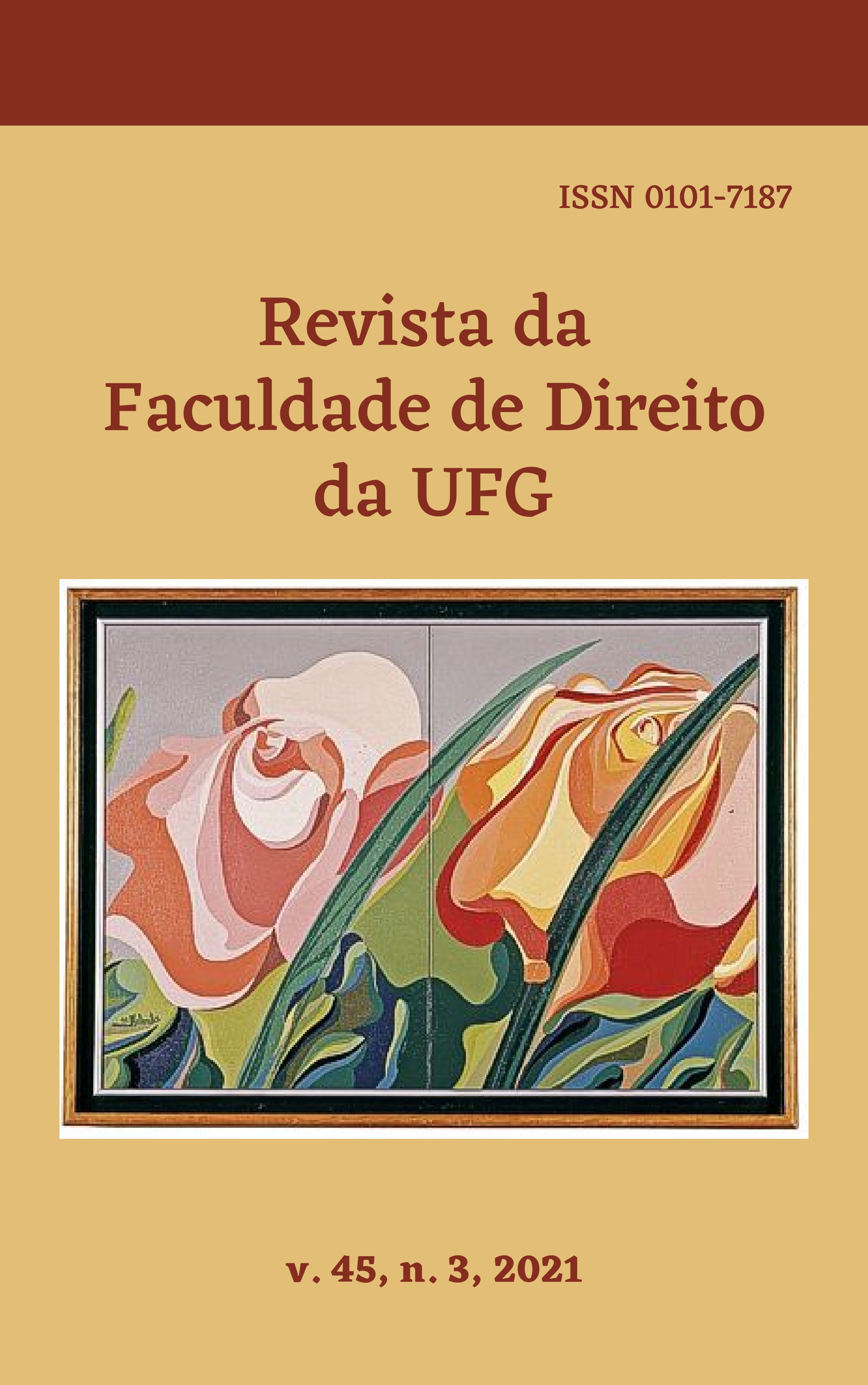“WE ARE THE FIRST TO BE ACCUSED”: A STUDY ON “ANTIGYPSYSIM” AND COLONIAL PERMANENCES IN BRAZILIAN LAW
DOI:
https://doi.org/10.5216/rfd.v45i3.63409Keywords:
Gypsies people, Legal Anthropology, History of Law, ColonialityAbstract
In recent years, the narratives about living conditions of the Brazilians Gypsies People, associated with social exclusion, prejudices and racial discrimination, have been provoking and attracting a series of actors, individual and collective, as well as organs of the state bureaucracy, to think and intervene in this. reality. This article seeks to understand how the laws and policies of the colonial period were mobilized and how they can have an impact on the construction of the legal and political condition of “gypsies” in Brazil. A genealogical study was carried out, from primary and secondary sources, on how the presence of “gypsies” people were managed in Brazilian territory, during the period of Portuguese colonization. The analysis and data survey of “anti-Gypsy” policies and laws, carried out in this study, are not necessarily chronological, nor do they contemplate the totality of existing measures aimed at the management of “Gypsy people” in Brazil. In addition to the documentary and bibliographic investigation, this study integrated field research with the direct and participant observation of the authors, in activities in which the “Gypsy people” act within the scope of the state bureaucracy, especially the processing of the Bill 248/2015, which intends to create the “Gypsy Statute”. There is a network of practices and meanings about the “gypsy” condition that have been woven since the past, connected to the present, from new bases, which we chose to analyze in this study.
Downloads
References
______. Decreto n° 5978, de 4 de dezembro de 2006. Diário Oficial [da] República Federativa do Brasil, Poder Executivo, Brasília, DF, 2006b. Disponível em: <http://www.planalto.gov.br/ccivil_03/_Ato2004-2006/2006/Decreto/D5978.htm>. Acesso em: 27 out. 2019.
CHAUÍ, Marilena. Brasil: mito fundador e sociedade autoritária. São Paulo: Fundação Perseu Abramo, 2000.
CHINA, J. d?Oliveira. Os ciganos do Brasil. Revista do Museu Paulista, São Paulo, tomo XXI, 1936. p. 323-669.
COELHO, A. Os ciganos de Portugal. Lisboa: Dom Quixote, 1995.
COSTA, Elisa Maria Lopes da. Contributos ciganos para o povoamento do Brasil (séculos XVI - XIX). Arquipélago - Revista da Universidade de Açoures, Açoures, v. 9-10, 2005.
DAS, Veena; POOLE, Deborah. El Estado y sus márgenes. Etnografias comparadas. Cuadernos de Antropologia Social, Buenos Aires, n.27, p. 19-52, 2008.
DONOVAN, Bill M. Changing perceptions of social deviance: Gypsies in early modern Portugal and Brazil. Journal of Social History, s.l., 1992.
FOUCAULT, Michel. Microfísica do Poder. Rio de Janeiro: Graal, 2012.
FRASER, Angus. The Gypsies. Oxford: Blackwell Publishers, 1992.
FREITAS, Joaquim Ignacio de. Collecção chronologica de Leis extravagantes, posteriores a'nova compilação das ordenações do reino, publicadas em 1603. Coimbra, 1819.
GOLDFARB, Maria Patrícia Lopes. Memória e etnicidade entre os Ciganos Calon em Sousa-PB. João Pessoa: Editora da UFPB, 2013.
MPF. Discriminação e preconceito são rotina enfrentada por ciganos na Paraíba. Ministério Público Federal, 2017. Disponível em: <http://www.mpf.mp.br/pb/sala-de-imprensa/noticias-pb/discriminacao-e-preconceito-sao-rotina-enfrentada-por-ciganos-na-paraiba>. Acesso em: 11 fev. 2020.
MOONEN, Frans. Anticiganismo: os ciganos na Europa e no Brasil. 3. ed. Recife: [s/e], 2011. Disponível em: < http://www.dhnet.org.br/direitos/sos/ciganos/a_pdf/1_fmanticiganismo2011.pdf>. Acesso em: 27 out. 2019.
NORONHA, Gilberto Cézar de. Os gadjós são os “perfeitos ciganos, muito ciganos”: figurações, estereótipos e artimanhas políticas em Minas Gerais. In: ANPUH-Brasil – 30º Simpósio Nacional de História, Recife, 2019.
QUIJANO, A. Colonialidade, Poder, Globalização e Democracia. Revista Novos Rumos, São Paulo, ano 17, n. 37, p. 4-28, 2002.
______. Colonialidade do poder, eurocentrismo e América Latina. In: A colonialidade do saber: eurocentrismo e ciências sociais: perspectivas latino-americanas. Buenos Aires: CLACSO, 2005.
RAMOS, Arthur. Introdução à antropologia brasileira. V. 4. As culturas europeias. Rio de Janeiro: Casa do Estudante do Brasil, 1947.
REA, Caterina Alessandra. Redefinindo as fronteiras do póscolonial. O feminismo cigano no século XXI. Estudos Feministas, Florianópolis, v. 25, n. 1, fev. 2017. p. 31-50.
RESENDE, Garcia de. Cancioneiro Geral. Stuttgart Gedruckt auf Kosten des litterarischen Vereins, 1852.
SEGATO, Rita. La argamasa jerárquica: violencia moral, reproducción del mundo y la eficacia simbólica del derecho. In: Las estructuras elementales de la violencia. Ensayos sobre género entre la antropología, el psicoanálisis y los derechos humanos. Buenos Aires: Universidad Nacional de Quilmes/Prometeo, 2003. p. 107-130.
______. Género y colonialidad: en busca de claves de lectura y de um vocabulario estratégico descolonial. In: K. Bidaseca & V. V. LABA (Eds.), Feminisimos y Poscolonialidad. Descolonizando el feminismo desde y en América Latina. Buenos Aires: Godot, 2011.
SIMÕES, Maria Alzira Proença (Org.). Catálogo dos impressos de tipografia portuguesa do século XVI. Lisboa: Biblioteca Nacional, 1990.
TEXEIRA, Rodrigo Corrêa. História dos ciganos no Brasil. Recife: Núcleo de Estudos Ciganos, 2008
TV MPF. Audiência Pública Maio Cigano 28/05/2018. 2018. (3h45m56s). Disponível: <http://www.tvmpf.mpf.mp.br/videos/2836>. Acesso em: 23 fev. 2018.
TV SENADO. Estatuto do Cigano. 2018. (2h09m12s). 2018. Disponível em: < https://www.youtube.com/watch?v=SCzeao1ZUn4&t=4337s>. Acesso em: 18 out. 2019.
WAGNER, Francis S. The Gypsy Problem in Postwar Hungary. Hungarian Studies Review, v. XIV, n. 1, 1987.
Downloads
Published
How to Cite
Issue
Section
License
Os Autores que publicam nesta revista concedem à Revista da Faculdade de Direito da UFG uma licença mundial, sem royalties, sujeita aos termos e condições da Licença Jurídica Creative Commons Atribuição 3.0 Brasil Creative Commons Attribution License
Os autores concedem à RFD UFG todos os direitos autorais sobre os artigos nela publicados, que os mantêm com exclusividade até o advento de domínio público sobre os mesmos.
























